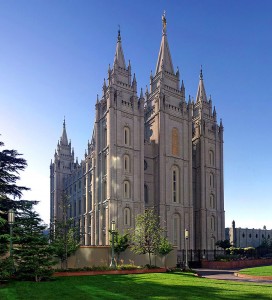Rules Are for Schmucks: Fraud by Any Other Name
 Salt Lake Temple in Salt Lake City, Utah. Photo by Entheta via Wikimedia Commons
Salt Lake Temple in Salt Lake City, Utah. Photo by Entheta via Wikimedia Commons An overwhelming portion of news stories are so depressing—why do we bother with them at all? Possibly it’s because every now and then a gem pops up, bringing not just a smile but a glimmer of hope that maybe someday things will start to get better.
A recent news story from England falls into this category. A British citizen named Thomas Phillips read about a 2006 statute enacted by Parliament, making it illegal to make false representations for profit. In other words, if I tell you that all I need is a quick £500 account opening fee in order to secure for you the million pounds left to you by your long-dead third cousin, I’m in big trouble.
Phillips looked around for people who might be attempting to defraud others for profit, and soon settled on …
The Church of Jesus Christ of the Latter-Day Saints, commonly known as the Mormons.
Phillips actually doubts, for example, that humanity was first created only 6,000 years ago in the Garden of Eden, which the Mormons insist was located in Missouri. He is also dubious about the story of Joseph Smith and the golden plates, on which the Book of Mormon is purportedly inscribed and that have somehow evaporated back up to heaven. And he’s decidedly skeptical about the fundamental theme of that book, that Native Americans are descended from a Jewish family that crossed the ocean in 600 BCE. He adds four other similarly laughable tenets of the faith to the list.
Assume, just for a moment, that at least one of Phillips’ suspicions happens to be on the mark. My book, Damned Good Company, details facts that support such a conclusion. And is the Mormon Church profiting from these misrepresentations? You’d better believe it is, to the tune of billions of dollars every year. A few years ago, someone crunched numbers to show that if it were a corporation, the Mormon Church would rank 243rd on the Fortune 500 list. It is also the largest single foreign landholder in Britain.
So if you have ludicrously false representations producing mind-boggling profits, why exactly shouldn’t the 2006 law apply? Isn’t that what it’s all about? That’s the question nagging at the conscience of one British judge, who is refusing to treat the complaint as capricious. In fact, his court just approved the plaintiff’s request for a summons requiring Thomas Monson, the Mormon equivalent of the pope, to appear in court on March 14 and answer some tough questions about his organization’s allegedly false statements. “Failure to attend may result in a warrant being issued for your arrest,” the judge helpfully adds.
This is causing God experts everywhere to lose their lunch. How preposterous to consider for even a moment the notion that they should have to abide by the same anti-fraud laws as everyone else! Jewish God experts might have to justify in court why cutting little boys’ genitals without their permission (and for a fee) is God’s will. Muslims might have to do the same thing for little girls. Christians don’t necessarily cut people, but the fear of hell they instill has profited them quite handsomely over the centuries. Buddhists might have to account for the millions they rake in from displaying fake relics.
The likely result here is that the Mormons’ high-priced lawyers will find a way to wiggle out of this, that Mr. Monson will not have to fly over from Utah to explain himself, and that other God experts will remain free to keep victimizing the gullible as efficiently as they can. The scope of fraud laws will remain restricted to the petty con artists, and continue to ignore the grand masters of the art.
But it’s worth slogging through a hundred news items about murders, deficits, blizzards, and epidemics just to unearth one flicker of hope as bright as this one.
Click here to read all of Luis Granados’ Rules Are for Schmucks series.
